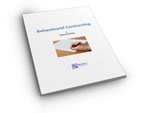 Michael was the director of strategy, and a board member of a prestigious city institution. He had instigated a number of projects that were regarded as being of signifcant benefit to the business. However, he had found that his positive start was now being undermined by an inconsistency in his approach.
Michael was the director of strategy, and a board member of a prestigious city institution. He had instigated a number of projects that were regarded as being of signifcant benefit to the business. However, he had found that his positive start was now being undermined by an inconsistency in his approach.
Although successful, he believed he could have achieved far more in his working life if he had not been held back with what he termed “a lack of confidence”. Michael felt this manifested itself in anxiety and an inconsistency in the way he managed situations such as board meetings. A coaching programme of 12, one-and-a-half hour sessions was agreed. During the behavioural contracting state the identified outcomes included: ‘Being able to devise strategies for consistent presentation of ideas’, at board meetings ‘identifying self-defeating thinking styles and appropriate counter-measures’ and ‘to minimise using a scale of 0-8 (0= none and 8 = serious anxiety) the personal experience of anxiety from 6 to 3’.
A series of psychometric tests were employed to identify his personality type and associated strengths and weaknesses, as away of helping him highlight the skills he needed to develop. CBC helped Michael to identify his thinking style. By focusing on his thoughts and feelings he was able to see how his current thinking style had a negative impact on his performance. He became aware of how the inconsistency he experienced related directly to his perception of situations. One of the key challenges Michael faced was a fear of failure that manifested itself in a preoccupation with what people would think about him. He recognised that this type of thinking stopped him from being able to make objective judgements. Michael’s ‘homework’ was designed to help him identify his thoughts, the feelings these generated, and the behaviours he then nmanifested together with the counter-measures he could employ.
By the end of the coaching programme, Michael had become more consistent in his presentation to others and in his personal thinking style and was able to cite a number of examples of dealing with difficult meetings in a calm and effective manner. He was also able to give examples of the comments received that confirmed that others had perceived a change in him. Since completion of his coaching programme, Michael is now seen as a key player in the organisation.
Find out more about the Transformational Coaching Programme here.






